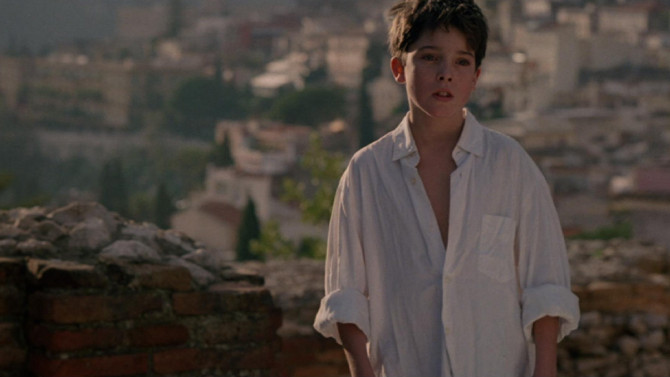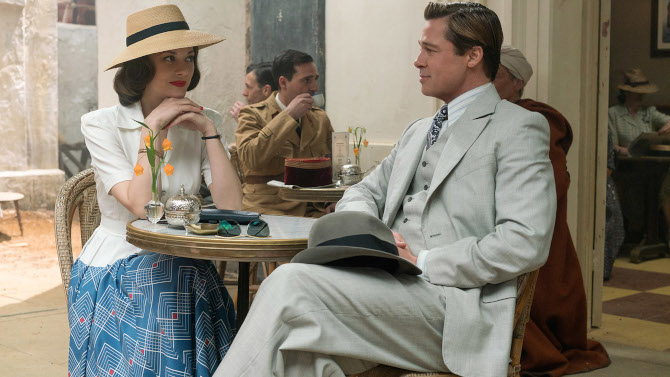
Déjà vu Dalliance
Channeling the mesmeric movies churned out by the studio system back in the 1930s and 40s, Allied (2016), directed by Robert Zemeckis, channels the likes of Morocco, Casablanca, Across the Pacific, Gilda, To Have and Have Not, and numerous others – attempting to find a spark from the classic themes of melodrama, romance, suspense and the epic nature of the annals of the cinematic past, with quite successful results. Set the year Casablanca and Across the Pacific were released – 1942, the story in fact starts in Morocco, with recently parachuted in Canadian spy Max Vatan (Brad Pitt) meeting up with another undercover agent, Marianne Beauséjour (Marion Cotillard), who will be pretending to be his wife.
-

Modern Love
A Bigger SplashApril 28, 2017Sex and drugs and rock `n roll. . . (and marriage?) play a big part in the 2015 dramatic thriller A Bigger Splash. A quasi-remake of the 1969 film La Piscine (which has another sort-of remake in François Ozon’s 2003 picture The Swimming Pool), which itself comes from a novel of the same name (written by Jean-Emmanuel Conil under the pseudonym Alain Page), this very European feature is set on the lovely Italian island of Pantelleria. We first meet music icon Marianne Lane (Tilda Swinton – a perfect turn as an androgynous David Bowie-like rock `n roller), who is recovering from throat surgery, and her documentary filmmaker husband Paul De Smedt (Matthias Schoenaerts) as they enjoy the reclusive island, finding love and recuperation in its serene, picturesque setting. As they are frolicking in the waters of a secluded lake, they receive a call from Paul’s kind-of best friend and Marianne’s former lover/record producer, Harry Hawkes (Ralph Fiennes), who has tracked them down and invited himself for a visit. Director Luca Guadagnino both symbolically and literally interprets the rather rude interruption by having Harry’s incoming plane cast a long shadow and make a raucous noise just over their heads as they take the unexpected and unwanted call.
-
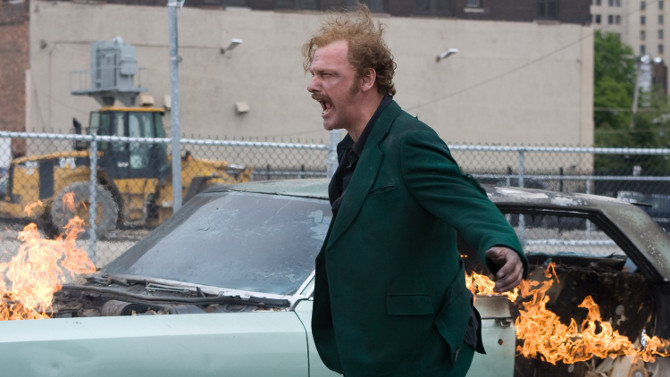
Oh Danny Boy
Kill the IrishmanApril 23, 2017A true example of a hidden gem, the based-on-a-true-story crime film Kill the Irishman, directed by Jonathan Hensleigh and released in 2011, earned just over one million dollars at the box office, making it a motion picture that has sadly been missed by way too many people. Set in Cleveland, we are first introduced to our lead, Danny Greene (Ray Stevenson – Rome; Thor) in 1975, a criminal who always seems to be in the line of fire – at this point, he dodges death by leaping from his moving car after realizing it has been wired to blow. Hensleigh then transports us back to the beginning of the tale through narrator and cop Joe Manditski (Val Kilmer), as he provides us with a look at the complex gangland of Cleveland and the childhood of our main player (as he grew up on the same streets as Greene), eventually leading us to the point where Danny’s story skyrockets, in 1960, with him working as a longshoreman on the docks. It is an opening that in many ways pays tribute to Martin Scorsese’s Goodfellas.
-
Star Pick with Noah Lang
 Off to See the WizardsWizardsApril 11, 2017
Off to See the WizardsWizardsApril 11, 2017Some time ago, I was fortunate enough to attend a special screening of the Tribeca Audience Award Winner for Best Picture, Here Alone, at an event held by the St. Lawrence International Film Festival in Potsdam, New York. In attendance were director Rod Blackhurst, writer David Ebeltoft and producer Noah Lang. Over the next several weeks, each of their respective Star Picks will be posted (in honour of the release of the film in theatres), each with a lengthy interview that should give you an insight into the world of movie making from three talented up and comers in the industry. Today, I introduce Noah Lang. Son of talented character actor Stephen Lang (Avatar; Don’t Breathe), Noah has had a fruitful start to his career. With a wide array of films to his name already, he also produced another feature that was shown at the St. Lawrence International Film Festival, the well received Band of Robbers, though Here Alone is what I am going to focus on today – as it has solid momentum heading into its release. Lang’s work on the project is detailed quite nicely in the interview, and it will most likely say more that I can say here with the written word, so check it out below. It will give you insight into Here Alone, a clear picture for those unsure as to what a producer actually does, an idea of the complexity of the business, as well as so much more.
-

Lost. . . in the Adirondacks
Here AloneApril 7, 2017Filmed in the heart of the Adirondacks in New York State, Tribeca Film Festival Audience Award Winner Here Alone utilizes its locale to great effect. Capturing its rich vivid landscapes, be it rolling hills and mountains or lush forests surrounding a still lake, screenwriter David Ebeltoft and director Rod Blackhurst juxtapose the idyllic setting with a sense of loneliness, loss and secluded dread. Though at first glance, Here Alone may resemble your typical zombie flick, it is, at its heart, a searing character drama, while the infected flit around the periphery. Our main character is Ann (Lucy Walters), a young woman living by herself in the middle of a leafy forest which surrounds a chilly lake. The first portion of the motion picture plays like a taut, tense silent film, as we witness her struggles to survive. Lacking food, fighting the elements and struggling with her own pained past, she is utterly alone. By way of flashbacks, we are introduced to her baby girl and her survivalist husband Jason (Shane West), the one who brought her way out into the woodsy setting to survive. We slowly learn their fates over time.
-
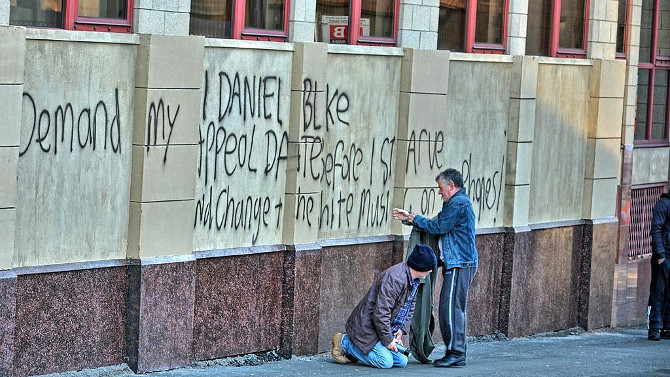
Another Brick in the Wall
I, Daniel BlakeMarch 26, 2017A trenchant piece of social commentary, I, Daniel Blake could have been a one dimensional film filled with gloomy despair, but in the capable hands of director Ken Loach and first time actor and long time comedian Dave Johns, it is laced with deft, dry, sarcastic humour throughout – making it a relevant, multi-faceted dramedy. Written by Paul Laverty (a regular collaborator with Loach), the modern day tale, which is set in Newcastle, England, follows a fifty-nine year old carpenter named Daniel Blake (Johns), who, as the film begins, is frustratingly dealing with a government employee over the phone. They have denied his claim for ‘employment and support allowance’ – despite the fact that he has had a debilitating heart attack and his doctors vehemently state that he is in no shape to return to work. A wonderful piece of sardonic humour, this opening scene finds the man having to put up with a plethora of unrelated questions that have nothing to do with his particular condition. Highlighting the lack of common sense or logic found in the modern day governmental system, it is somewhat akin to a man continuously banging his head around the rim of a toilet seat (it hurts, is irritating and, in the end, gets you absolutely nowhere).
-
Star Pick with Mark Valley
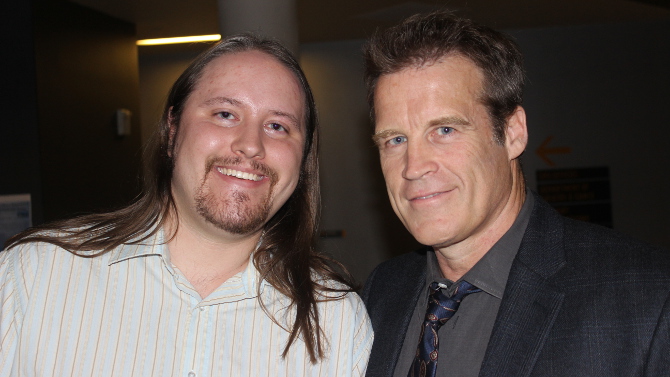 Dream WeaverLéoloMarch 21, 2017
Dream WeaverLéoloMarch 21, 2017I was fortunate enough recently to spend some time with Mark Valley. The actor has become a major player in the world of television, already having left a lasting impact in what has been termed ‘The Golden Age’ of the medium. Playing major roles on Boston Legal (Brad Chase), Human Target (Christopher Chance), Harry’s Law (Oliver Richard), Body of Proof (Tommy Sullivan), Crisis (CIA Director Widener), CSI: Crime Scene Investigation (Daniel Shaw), and so many other shows, he has developed many unique and intriguing characters over his twenty plus years in the business. If I had to choose one performance that exemplifies his craft, it would be his turn as John Scott in the science fiction drama Fringe – though he only appeared in twelve episodes (in a series that lasted five seasons), his character left a lasting impact that was felt long after his arc was over. Valley is currently working on a new series titled Famous in Love, which premieres next month. Valley has also dabbled in film, most notably in features like The Siege, Stolen, Zero Dark Thirty, Live by Night, as well as voicing The Cyclops in Shrek the Third. A proud Northern New Yorker (born in Ogdensburg), Valley has played an integral part in starting the St. Lawrence International Film Festival, set on both the American (Potsdam and Canton) and Canadian (Ottawa and Brockville) sides of the border. Having a place on the advisory board, the festival is currently expanding online, highlighting short films which deserve kudos each month.


